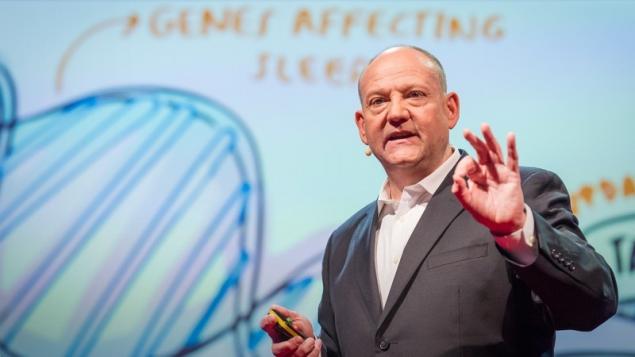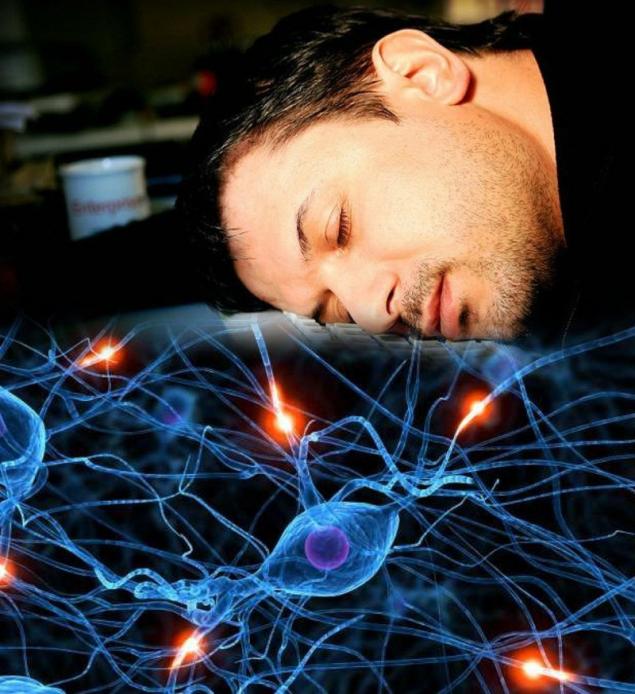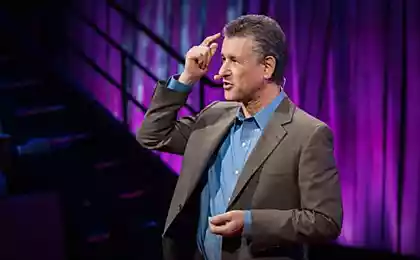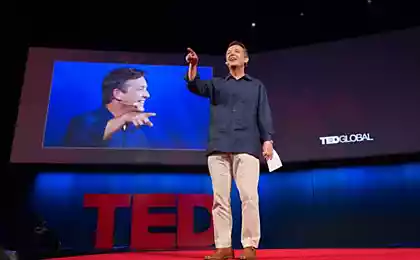686
Russell foster: Why do we sleep?
TED Talk Subtitles and Transcript: Russell foster is a circadian neuroscientist. He studies the sleep cycles in the brain. And he asks: what do we know about sleep? A little, as it turns out, for things, which occupies a third of our lives.
In his speech foster talks about three popular theories that explain why we sleep, and destroys a few myths about how much sleep is required for people of different ages, and hints at a new beneficial use of sleep as a predictor of mental illness.

0:11 what I'd like to talk about today is one of my favorite subjects, and that is the neuroscience of sleep.
0:19 that sound — (Alarm) — Oh, works — the sound horribly, horribly familiar to most of us. Of course, this is the sound of the alarm clock. And what that truly ghastly, awful sound does is stop the single most important behavioral experience that we have, our sleep. If you are an average person, 36% of your life you spend in sleep. This means that if you live to 90 years, 32 years to be spent on sleep.
1:00 These 32 years is telling us is that sleep at some level is important. The majority of us does not think too much about sleep. We throw it away. We just don't think about sleep. Today I'm going to change your views, change your ideas and opinions about sleep. And the journey that I want you to take, we must begin with a return to the past.
1:27 "Enjoy the honey-heavy dew of slumber". Guess who said it? Julius Caesar By Shakespeare. Yes, let me give you a few more quotes. "O sleep, o gentle sleep! Our Keeper, I'm scared?" Shakespeare again, from -- I won't say it -- the Scottish play. [Correction: Henry IV, Part 2] (Laughter) At the same time: "Sleep is the Golden chain that ties health and our bodies together." Extremely prophetic, by Thomas Dekker, another Elizabethan dramatist.
2:03 But if we jump forward 400 years, the tone about sleep changes somewhat. Thomas Edison, the beginning of the 20th century. "Sleep is a criminal waste of time and a heritage from our cave days." Bach. (Laughter) If we go back to 1980, some of you may remember as Margaret Thatcher is attributed the words: "the Dream rags". And of course the infamous -- what was his name? — as told by the odious Gordon Gekko from "wall Street: Money never sleeps".
2:37 What do we do with sleeping in the 20th century? Of course, we use a light bulb of Edison to win the night to occupy the darkness, and in the process of this occupation, we were treated to a dream almost like a disease. We treated him like the enemy. At best, I think we agree on the importance of sleep, and at worst perhaps many of us think of sleep as an illness that must be cured. And our ignorance about sleep is really quite profound.
3:09 Why? Why do we abandon sleep in our thoughts? Because you do nothing while you sleep, as it seems. You don't eat. You don't drink. Don't have sex. Most of us at least. From this follows — I'm sorry — it was a complete waste of time, right? Wrong. In fact, sleep is an incredibly important part of our biology, and neuroscientists are beginning to explain why it's so important. Let's turn to the brain.
3:42 Here we have a brain. It was donated by a social scientist, who said that he did not know what it is and how to use it, so — (Laughter) sorry — so I took it. I don't think they noticed. Well. (Laughter)
4:05 I want to say that when you're asleep, this thing doesn't shut down. In fact, some areas of the brain are more active during sleep than during wakefulness. Another very important thing about sleep is that it is not any particular structure in the brain, and to some extent by the body itself. If we reverse the brain — I like this piece of the spinal cord, we see the hypothalamus, but many interesting structures, and not the last are the biological clock. Biological clock telling us when to be awake and when to sleep. This structure interacts with many other areas of the hypothalamus, lateral hypothalamus, ventrolateral preoptions core. They are all linked, they all send projections down to the brainstem. It then transmits the signal, affecting the cortex of the brain, this amazing wrinkled thing, with neurotransmitters that keep us in a state of wakefulness and provide for the operation of our consciousness. Sleep comes as a result of many different interactions in the brain; in fact, sleep comes and goes as a result of the range of interactions in here.

5:16 now. Where are we headed? We said that sleep is complicated and it takes 32 years of our life. But what I explained is what it is. Why do we sleep? You, of course, no surprise that us scientists have no single point of view. There are dozens of different ideas about why we sleep, I'm going to outline three of those.
5:42 First idea is the idea of restoring, to some extent it is intuitive. Everything we spent for the day, we restore, replace, rebuild during the night. As an explanation, this idea goes back to Aristotle, so that it is more than 2 300 years. She went in and out of fashion. It is fashionable now, because it turned out that in the brain of many genes involved in work only during sleep, these genes are associated with restoration and metabolic channels. So there is a good evidence of this hypothesis.
6:17 what about power saving? Again, perhaps intuitive. You essentially sleep to save calories. When you do calculations, it doesn't really pan out. Take a man who has slept all night, or awake, but do not move, the energy saving of sleeping is about 110 calories. This is the equivalent of a hot dog. I can say that hot dog is a pretty meager return for such a complex and demanding behavior as sleep. So I'm less convinced by the idea of saving energy.
6:57 But the third idea I'm quite attracted to, which is brain processing and memory consolidation. We found that after you've tried to learn a task, and you sleep-deprive individuals, the ability to learn that task is smashed. It's really hugely attenuated. So sleep and memory consolidation is also very important. However, it is not only the formation of memories for later playback. What is really amazing is our ability to come to solutions to complex problems is hugely enhanced by a night of sleep. Scientists estimate that it gives a triple advantage. Sleeping at night enhances our creativity. At this time there is the fact that in the brain, those neural and synaptic connections that are important, are linked and strengthened, while those that are less important fade and lose significance.
7:51 so we have three explanations for why we sleep. I think it is important to understand that the details may vary, and apparently, we sleep for a number of reasons. But sleep is not a privilege. It's not something that can be treated casually. I think that sleep was once likened to the upgrade from "economy" to "business", so to speak. It's not even an upgrade to first class from economy. It is important to understand that if you don't sleep, you don't fly. You just never get on the plane. Surprisingly in our modern society that we are all terribly lacking of sleep.
8:35 Let's turn to loss of sleep. A huge part of society are sleep-deprived, let's look at our sleep-o-meter. Data show that in the 50s most of us received about 8 hours of sleep per night. Today, we sleep one and a half to two hours less every night, so we're in the "six and a half hours every night." With teenagers the situation is even worse. For full brain performance they need nine hours of sleep, many of them during their studies receive only five hours of sleep. This is simply not enough. We now turn to other members of society, the elderly. If you are elderly, your ability to sleep long somewhat weakened, many sleep, again, less than 5 hours per night. Shift work. Shift work is extraordinary, perhaps 20 percent of the working population, and the body clock does not adapt to the needs of those who work at night. They live on the same cycles, light-dark, like most of us. When the poor old shift worker is going home to try and sleep during the day, desperately tired, the body clock saying, "Wake up. At this time, to be awake." The quality of sleep that you get as a night shift worker is usually very poor, again it's about 5 hours of sleep. Of course, tens of millions of people suffer from jet lag. So who here has jet lag? Wow, amazing. Thank you very much, that you're not asleep, because that's what your brain.
10:02 One of the things that engage the brain, is microcon. This involuntary falling asleep, and you can't essentially control it. Microny can lead to embarrassment but can also lead to death. It has been estimated that 31% of drivers will fall asleep behind the wheel at least once in a lifetime, in the U.S. statistics are staggering: 100,000 accidents on highways were caused by fatigue, loss of vigilance, and falling asleep. A hundred thousand a year. This is incredible. On another level of horror, we turn to the disaster at Chernobyl and the space Shuttle Challenger, who we so tragically lost. Investigation of the incident revealed that the incorrect assessment of the situation as a result of extended shift work and loss of vigilance and tiredness was the cause of these disasters.
10:59 When you are tired, when you lack sleep, you weakened memory and creativity, increased impulsiveness, and overall assessment of the situation is getting worse. But, my friends, is actually worse.
11:14 (Laughter)
11:17 If your brain is tired, he badly wants to get something, to Wake up. So drugs, stimulants. Caffeine represents the stimulant of choice across much of the Western world. Most of the day is fueled by caffeine, and if you're really naughty tired brain, nicotine. Of course, when you are pushing the awake mode such stimulants, at 11 o'clock at night the brain says, "actually, I need to sleep soon. What do I do if I'm feeling completely wired?" Of course, you then resort to alcohol. Alcohol, briefly, once or twice, to use to mildly sedate you, can be useful. It can actually ease the sleep transition. But you have to understand that alcohol doesn't provide sleep, a biological mimic for sleep. It soothes you. So he actually harms some of the neural processes that occur during consolidation and memory retrieval. So it's a short-term acute measure, but for God's sake, don't become addicted to alcohol as a way of getting to sleep every night.

12:20 Lack of sleep is also associated with weight gain. If every night you sleep five hours or less, have a 50 percent chance of being obese. What is the connection? It is assumed that a lack of sleep increases production of ghrelin, the hunger hormone. Ghrelin is released. Enters the brain. The brain says, "I need carbs". And then he begins to demand the carbs and especially sugar. So there is a connection between tiredness and the metabolic predisposition for weight gain.
12:53 of Stress. Tired people are massively stressed. One of the consequences of stress, of course, is loss of memory, which is what I recently mentioned. But the stress is so much more. If you have a sudden stress, not too scary, but if the sustained stress associated with sleep loss that's the problem. Constant stress leads to poor immune system, tired people are more prone to all infections. There is very good research showing that night shift workers more prone to cancer. Increased levels of stress throw glucose into the blood. Glucose becomes a dominant part of the vasculature and essentially you become glucose intolerant. That is, the type II diabetes. Stress increases the level of cardiovascular diseases as a result of high blood pressure. There are a number of things associated with sleep deprivation are more serious than minor violations of brain activity, which is where I think most people lack of sleep.
13:56 In this speech, it would be good to ask, do you think that in General you get enough sleep? So a quick show of hands. Who feels that getting enough sleep? Wow. That's impressive. Well. We will talk about this later, about what you techniques.
14:13 Most of you are surely wondering: "How do I know whether I'm getting enough sleep?" It's not rocket science. If you need alarm clock in the morning to get out of bed, if you can't get up, if you need stimulants, if you're grumpy, if you are irritable, if your colleagues say you look tired and irritable, it is likely that you have a lack of sleep. Listen to them. Listen to yourself.
14:36 What do you do? That may seem offensive — for dummies sleep: turn your bedroom into a haven for sleep. First of all, you need to make it darker and a little cold. It is very important. Reduce the amount of light at least half an hour before bedtime. Light increases levels of alertness and will delay sleep. What makes most of us to sleep? We stand in a massively lit bathroom looking in the mirror and brush our teeth. This is the worst thing we can do before going to sleep. Disconnect your mobile. Turn off the computers. Turn off all of those things can excite the brain. Late try not to drink coffee, it is best not to drink it after lunch. We talked about reducing light exposure before bedtime, but the light in the morning is very good at setting the biological clock to a cycle of day and night. Look for the light in the morning. Basically, listen to yourself. Calm down. Do those things that relax you, which create the honey-heavy dew of slumber.
15:45 now. These are the facts. How about myths?
15:48 Teenagers are lazy. No. The poor man. They have a biological predisposition to stay up late and Wake up late, so give them a break.
15:56 We need eight hours of sleep per night. On average. Some people need more. Some people need less. You need to listen to your body. You need as much or more? So simple.
16:09 Older people need less sleep. Not true. The need for sleep with age is not reduced. Sleep breaks down and becomes less strong, but the needs do not go down.
16:22 of the Fourth myth is, early to bed and early to rise makes a man healthy, wealth and wise. This is wrong on so many levels. (Laughter) there is No evidence that before waking up and before going to bed, you will raise welfare. The difference in socio-economic status no. In my experience, the difference between larks and owls, only that those who Wake up early in the morning, a terrible glory hogs.
16:51 (Laughter) (Applause)

16:55 Finally, in these last minutes, I want to change the subject and talk about some brand new, outstanding neuroscience research, about the relationship of mental health, mental illness and sleep disorders. For the past 130 years as you know that serious mental illness is always accompanied by sleep disorders, but this fact is widely ignored. In the 1970-ies, when people again mentioned this, they said: "of Course, patients suffer from sleep disorders in schizophrenia, because they take antipsychotics. Antipsychotic drugs cause sleep problems". So were ignoring the fact that for a hundred years before that sleep disorders were diagnosed sooner than I started receiving antipsychotics.
17:36 What happens in the end? Many groups, some groups of scientists studying conditions such as depression, schizophrenia and [bipolar affective disorder], and what happens from the point of view of sleep disorders. We've done extensive research on schizophrenia in the last year, the data was incredible. Persons suffering from schizophrenia, for the most part, they were awake during the night and slept during the day. Other groups showed no dependence on the 24-hour cycle. Their sleep was absolutely smashed. Some could not regulate their sleep depending on the cycle day-night. Every time they were getting up later and later and later. The dream was shattered.
18:17 What's going on? Really exciting news is that mental illness and sleep are not just are dependent, they are physically linked in the brain. The neural networks that predispose you to normal sleep, give you normal sleep, and those that give you mental health, are superimposed on each other. How to prove it? Was the evidence in question normal sleep. When there are mutations, changes, there is a predisposition to mental illness. Last year we published a study: genes associated with schizophrenia, when mutated, also smashes the sleep. So we have evidence of direct connection of these two systems.
19:04 this study was followed by another work. First, sleep disturbance is preceded by some kinds of mental disorders. We have proven that young people who are in high risk of the disease BAR, suffer from sleep disorders even before clinical diagnosis BAR. We have obtained evidence that sleep disturbance can also exacerbate, make worse the mental illness state. My colleague Dan Freeman has used a range of substances to stabilize sleep and to reduce levels of paranoia in those individuals by 50 percent.
19:45 so what do we do? In connection with this question we have stunning insights. If we talk about the neuroscience, by understanding these two systems, we're really beginning to understand how sleep and mental illness are generated and regulated within the brain. Second, if we consider sleep and sleep disruption as an early warning signs, then we have a chance to intervene. If we know that these individuals are vulnerable, early intervention then becomes possible. Thirdly, I think that's the most interesting thing we can think of the sleep centers in the brain as a new therapeutic target. Stabilize sleep in those individuals who are vulnerable, we can certainly make them healthier, but also alleviate some of the appalling symptoms of mental illness.
20:32 Let me finish. I asked to take sleep seriously. Our attitudes toward sleep are so very different, starting with the pre-industrial era, when we were almost wrapped in a duvet. We understand intuitively the importance of sleep. And it's not some nonsense. This is a pragmatic response to good health. Good sleep improves concentration, attention, decision-making, creativity, sociability and health. Sleep reduces the susceptibility to mood changes, your stress, irritability and impulsiveness, tendency to alcohol and drugs. In conclusion, I will say that the understanding of the neurology of sleep really tells us about how it is necessary to consider some mental illnesses, and allows you to find new ways to treat these debilitating conditions.
21:26 Jim butcher, the fantasy writer, said, "Sleep is God. Go and pray." I can only recommend you to do the same.
21:34 Thanks for your attention.
21:35 (Applause) published
The lecture can be streamed here.
© TED Conferences, LLC
Also interesting: Scientists about the brain: the best of TED talks with a Russian voice acting
Ivan Pigarev: "Sleep is not a waste of time, and medicine"
P. S. And remember, only by changing their consumption — together we change the world! ©
Source: www.ted.com/talks/russell_foster_why_do_we_sleep/transcript?language=ru
In his speech foster talks about three popular theories that explain why we sleep, and destroys a few myths about how much sleep is required for people of different ages, and hints at a new beneficial use of sleep as a predictor of mental illness.

0:11 what I'd like to talk about today is one of my favorite subjects, and that is the neuroscience of sleep.
0:19 that sound — (Alarm) — Oh, works — the sound horribly, horribly familiar to most of us. Of course, this is the sound of the alarm clock. And what that truly ghastly, awful sound does is stop the single most important behavioral experience that we have, our sleep. If you are an average person, 36% of your life you spend in sleep. This means that if you live to 90 years, 32 years to be spent on sleep.
1:00 These 32 years is telling us is that sleep at some level is important. The majority of us does not think too much about sleep. We throw it away. We just don't think about sleep. Today I'm going to change your views, change your ideas and opinions about sleep. And the journey that I want you to take, we must begin with a return to the past.
1:27 "Enjoy the honey-heavy dew of slumber". Guess who said it? Julius Caesar By Shakespeare. Yes, let me give you a few more quotes. "O sleep, o gentle sleep! Our Keeper, I'm scared?" Shakespeare again, from -- I won't say it -- the Scottish play. [Correction: Henry IV, Part 2] (Laughter) At the same time: "Sleep is the Golden chain that ties health and our bodies together." Extremely prophetic, by Thomas Dekker, another Elizabethan dramatist.
2:03 But if we jump forward 400 years, the tone about sleep changes somewhat. Thomas Edison, the beginning of the 20th century. "Sleep is a criminal waste of time and a heritage from our cave days." Bach. (Laughter) If we go back to 1980, some of you may remember as Margaret Thatcher is attributed the words: "the Dream rags". And of course the infamous -- what was his name? — as told by the odious Gordon Gekko from "wall Street: Money never sleeps".
2:37 What do we do with sleeping in the 20th century? Of course, we use a light bulb of Edison to win the night to occupy the darkness, and in the process of this occupation, we were treated to a dream almost like a disease. We treated him like the enemy. At best, I think we agree on the importance of sleep, and at worst perhaps many of us think of sleep as an illness that must be cured. And our ignorance about sleep is really quite profound.
3:09 Why? Why do we abandon sleep in our thoughts? Because you do nothing while you sleep, as it seems. You don't eat. You don't drink. Don't have sex. Most of us at least. From this follows — I'm sorry — it was a complete waste of time, right? Wrong. In fact, sleep is an incredibly important part of our biology, and neuroscientists are beginning to explain why it's so important. Let's turn to the brain.
3:42 Here we have a brain. It was donated by a social scientist, who said that he did not know what it is and how to use it, so — (Laughter) sorry — so I took it. I don't think they noticed. Well. (Laughter)
4:05 I want to say that when you're asleep, this thing doesn't shut down. In fact, some areas of the brain are more active during sleep than during wakefulness. Another very important thing about sleep is that it is not any particular structure in the brain, and to some extent by the body itself. If we reverse the brain — I like this piece of the spinal cord, we see the hypothalamus, but many interesting structures, and not the last are the biological clock. Biological clock telling us when to be awake and when to sleep. This structure interacts with many other areas of the hypothalamus, lateral hypothalamus, ventrolateral preoptions core. They are all linked, they all send projections down to the brainstem. It then transmits the signal, affecting the cortex of the brain, this amazing wrinkled thing, with neurotransmitters that keep us in a state of wakefulness and provide for the operation of our consciousness. Sleep comes as a result of many different interactions in the brain; in fact, sleep comes and goes as a result of the range of interactions in here.

5:16 now. Where are we headed? We said that sleep is complicated and it takes 32 years of our life. But what I explained is what it is. Why do we sleep? You, of course, no surprise that us scientists have no single point of view. There are dozens of different ideas about why we sleep, I'm going to outline three of those.
5:42 First idea is the idea of restoring, to some extent it is intuitive. Everything we spent for the day, we restore, replace, rebuild during the night. As an explanation, this idea goes back to Aristotle, so that it is more than 2 300 years. She went in and out of fashion. It is fashionable now, because it turned out that in the brain of many genes involved in work only during sleep, these genes are associated with restoration and metabolic channels. So there is a good evidence of this hypothesis.
6:17 what about power saving? Again, perhaps intuitive. You essentially sleep to save calories. When you do calculations, it doesn't really pan out. Take a man who has slept all night, or awake, but do not move, the energy saving of sleeping is about 110 calories. This is the equivalent of a hot dog. I can say that hot dog is a pretty meager return for such a complex and demanding behavior as sleep. So I'm less convinced by the idea of saving energy.
6:57 But the third idea I'm quite attracted to, which is brain processing and memory consolidation. We found that after you've tried to learn a task, and you sleep-deprive individuals, the ability to learn that task is smashed. It's really hugely attenuated. So sleep and memory consolidation is also very important. However, it is not only the formation of memories for later playback. What is really amazing is our ability to come to solutions to complex problems is hugely enhanced by a night of sleep. Scientists estimate that it gives a triple advantage. Sleeping at night enhances our creativity. At this time there is the fact that in the brain, those neural and synaptic connections that are important, are linked and strengthened, while those that are less important fade and lose significance.
7:51 so we have three explanations for why we sleep. I think it is important to understand that the details may vary, and apparently, we sleep for a number of reasons. But sleep is not a privilege. It's not something that can be treated casually. I think that sleep was once likened to the upgrade from "economy" to "business", so to speak. It's not even an upgrade to first class from economy. It is important to understand that if you don't sleep, you don't fly. You just never get on the plane. Surprisingly in our modern society that we are all terribly lacking of sleep.
8:35 Let's turn to loss of sleep. A huge part of society are sleep-deprived, let's look at our sleep-o-meter. Data show that in the 50s most of us received about 8 hours of sleep per night. Today, we sleep one and a half to two hours less every night, so we're in the "six and a half hours every night." With teenagers the situation is even worse. For full brain performance they need nine hours of sleep, many of them during their studies receive only five hours of sleep. This is simply not enough. We now turn to other members of society, the elderly. If you are elderly, your ability to sleep long somewhat weakened, many sleep, again, less than 5 hours per night. Shift work. Shift work is extraordinary, perhaps 20 percent of the working population, and the body clock does not adapt to the needs of those who work at night. They live on the same cycles, light-dark, like most of us. When the poor old shift worker is going home to try and sleep during the day, desperately tired, the body clock saying, "Wake up. At this time, to be awake." The quality of sleep that you get as a night shift worker is usually very poor, again it's about 5 hours of sleep. Of course, tens of millions of people suffer from jet lag. So who here has jet lag? Wow, amazing. Thank you very much, that you're not asleep, because that's what your brain.
10:02 One of the things that engage the brain, is microcon. This involuntary falling asleep, and you can't essentially control it. Microny can lead to embarrassment but can also lead to death. It has been estimated that 31% of drivers will fall asleep behind the wheel at least once in a lifetime, in the U.S. statistics are staggering: 100,000 accidents on highways were caused by fatigue, loss of vigilance, and falling asleep. A hundred thousand a year. This is incredible. On another level of horror, we turn to the disaster at Chernobyl and the space Shuttle Challenger, who we so tragically lost. Investigation of the incident revealed that the incorrect assessment of the situation as a result of extended shift work and loss of vigilance and tiredness was the cause of these disasters.
10:59 When you are tired, when you lack sleep, you weakened memory and creativity, increased impulsiveness, and overall assessment of the situation is getting worse. But, my friends, is actually worse.
11:14 (Laughter)
11:17 If your brain is tired, he badly wants to get something, to Wake up. So drugs, stimulants. Caffeine represents the stimulant of choice across much of the Western world. Most of the day is fueled by caffeine, and if you're really naughty tired brain, nicotine. Of course, when you are pushing the awake mode such stimulants, at 11 o'clock at night the brain says, "actually, I need to sleep soon. What do I do if I'm feeling completely wired?" Of course, you then resort to alcohol. Alcohol, briefly, once or twice, to use to mildly sedate you, can be useful. It can actually ease the sleep transition. But you have to understand that alcohol doesn't provide sleep, a biological mimic for sleep. It soothes you. So he actually harms some of the neural processes that occur during consolidation and memory retrieval. So it's a short-term acute measure, but for God's sake, don't become addicted to alcohol as a way of getting to sleep every night.

12:20 Lack of sleep is also associated with weight gain. If every night you sleep five hours or less, have a 50 percent chance of being obese. What is the connection? It is assumed that a lack of sleep increases production of ghrelin, the hunger hormone. Ghrelin is released. Enters the brain. The brain says, "I need carbs". And then he begins to demand the carbs and especially sugar. So there is a connection between tiredness and the metabolic predisposition for weight gain.
12:53 of Stress. Tired people are massively stressed. One of the consequences of stress, of course, is loss of memory, which is what I recently mentioned. But the stress is so much more. If you have a sudden stress, not too scary, but if the sustained stress associated with sleep loss that's the problem. Constant stress leads to poor immune system, tired people are more prone to all infections. There is very good research showing that night shift workers more prone to cancer. Increased levels of stress throw glucose into the blood. Glucose becomes a dominant part of the vasculature and essentially you become glucose intolerant. That is, the type II diabetes. Stress increases the level of cardiovascular diseases as a result of high blood pressure. There are a number of things associated with sleep deprivation are more serious than minor violations of brain activity, which is where I think most people lack of sleep.
13:56 In this speech, it would be good to ask, do you think that in General you get enough sleep? So a quick show of hands. Who feels that getting enough sleep? Wow. That's impressive. Well. We will talk about this later, about what you techniques.
14:13 Most of you are surely wondering: "How do I know whether I'm getting enough sleep?" It's not rocket science. If you need alarm clock in the morning to get out of bed, if you can't get up, if you need stimulants, if you're grumpy, if you are irritable, if your colleagues say you look tired and irritable, it is likely that you have a lack of sleep. Listen to them. Listen to yourself.
14:36 What do you do? That may seem offensive — for dummies sleep: turn your bedroom into a haven for sleep. First of all, you need to make it darker and a little cold. It is very important. Reduce the amount of light at least half an hour before bedtime. Light increases levels of alertness and will delay sleep. What makes most of us to sleep? We stand in a massively lit bathroom looking in the mirror and brush our teeth. This is the worst thing we can do before going to sleep. Disconnect your mobile. Turn off the computers. Turn off all of those things can excite the brain. Late try not to drink coffee, it is best not to drink it after lunch. We talked about reducing light exposure before bedtime, but the light in the morning is very good at setting the biological clock to a cycle of day and night. Look for the light in the morning. Basically, listen to yourself. Calm down. Do those things that relax you, which create the honey-heavy dew of slumber.
15:45 now. These are the facts. How about myths?
15:48 Teenagers are lazy. No. The poor man. They have a biological predisposition to stay up late and Wake up late, so give them a break.
15:56 We need eight hours of sleep per night. On average. Some people need more. Some people need less. You need to listen to your body. You need as much or more? So simple.
16:09 Older people need less sleep. Not true. The need for sleep with age is not reduced. Sleep breaks down and becomes less strong, but the needs do not go down.
16:22 of the Fourth myth is, early to bed and early to rise makes a man healthy, wealth and wise. This is wrong on so many levels. (Laughter) there is No evidence that before waking up and before going to bed, you will raise welfare. The difference in socio-economic status no. In my experience, the difference between larks and owls, only that those who Wake up early in the morning, a terrible glory hogs.
16:51 (Laughter) (Applause)

16:55 Finally, in these last minutes, I want to change the subject and talk about some brand new, outstanding neuroscience research, about the relationship of mental health, mental illness and sleep disorders. For the past 130 years as you know that serious mental illness is always accompanied by sleep disorders, but this fact is widely ignored. In the 1970-ies, when people again mentioned this, they said: "of Course, patients suffer from sleep disorders in schizophrenia, because they take antipsychotics. Antipsychotic drugs cause sleep problems". So were ignoring the fact that for a hundred years before that sleep disorders were diagnosed sooner than I started receiving antipsychotics.
17:36 What happens in the end? Many groups, some groups of scientists studying conditions such as depression, schizophrenia and [bipolar affective disorder], and what happens from the point of view of sleep disorders. We've done extensive research on schizophrenia in the last year, the data was incredible. Persons suffering from schizophrenia, for the most part, they were awake during the night and slept during the day. Other groups showed no dependence on the 24-hour cycle. Their sleep was absolutely smashed. Some could not regulate their sleep depending on the cycle day-night. Every time they were getting up later and later and later. The dream was shattered.
18:17 What's going on? Really exciting news is that mental illness and sleep are not just are dependent, they are physically linked in the brain. The neural networks that predispose you to normal sleep, give you normal sleep, and those that give you mental health, are superimposed on each other. How to prove it? Was the evidence in question normal sleep. When there are mutations, changes, there is a predisposition to mental illness. Last year we published a study: genes associated with schizophrenia, when mutated, also smashes the sleep. So we have evidence of direct connection of these two systems.
19:04 this study was followed by another work. First, sleep disturbance is preceded by some kinds of mental disorders. We have proven that young people who are in high risk of the disease BAR, suffer from sleep disorders even before clinical diagnosis BAR. We have obtained evidence that sleep disturbance can also exacerbate, make worse the mental illness state. My colleague Dan Freeman has used a range of substances to stabilize sleep and to reduce levels of paranoia in those individuals by 50 percent.
19:45 so what do we do? In connection with this question we have stunning insights. If we talk about the neuroscience, by understanding these two systems, we're really beginning to understand how sleep and mental illness are generated and regulated within the brain. Second, if we consider sleep and sleep disruption as an early warning signs, then we have a chance to intervene. If we know that these individuals are vulnerable, early intervention then becomes possible. Thirdly, I think that's the most interesting thing we can think of the sleep centers in the brain as a new therapeutic target. Stabilize sleep in those individuals who are vulnerable, we can certainly make them healthier, but also alleviate some of the appalling symptoms of mental illness.
20:32 Let me finish. I asked to take sleep seriously. Our attitudes toward sleep are so very different, starting with the pre-industrial era, when we were almost wrapped in a duvet. We understand intuitively the importance of sleep. And it's not some nonsense. This is a pragmatic response to good health. Good sleep improves concentration, attention, decision-making, creativity, sociability and health. Sleep reduces the susceptibility to mood changes, your stress, irritability and impulsiveness, tendency to alcohol and drugs. In conclusion, I will say that the understanding of the neurology of sleep really tells us about how it is necessary to consider some mental illnesses, and allows you to find new ways to treat these debilitating conditions.
21:26 Jim butcher, the fantasy writer, said, "Sleep is God. Go and pray." I can only recommend you to do the same.
21:34 Thanks for your attention.
21:35 (Applause) published
The lecture can be streamed here.
© TED Conferences, LLC
Also interesting: Scientists about the brain: the best of TED talks with a Russian voice acting
Ivan Pigarev: "Sleep is not a waste of time, and medicine"
P. S. And remember, only by changing their consumption — together we change the world! ©
Source: www.ted.com/talks/russell_foster_why_do_we_sleep/transcript?language=ru






















